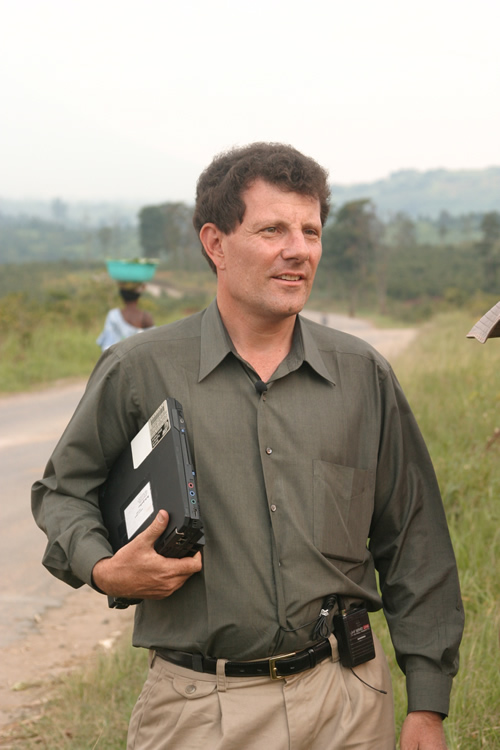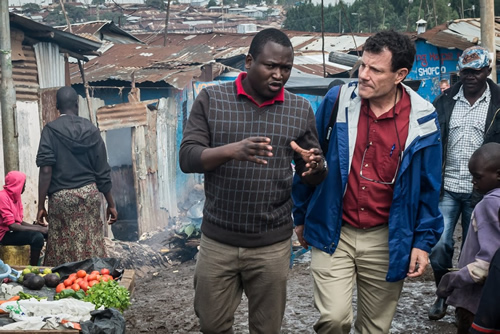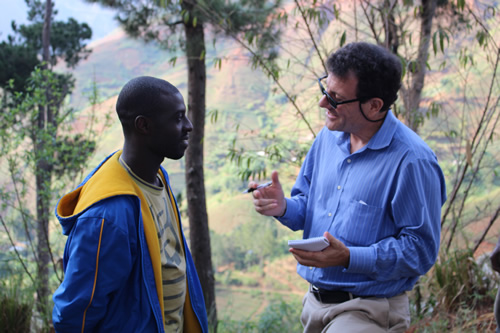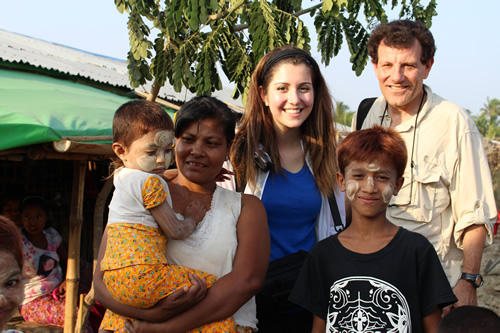A Path Appears: Transforming Lives,
Creating Opportunity
An interview with Nicholas D.
Kristof about an important new book co-written with his
wife Sheryl WuDunn, and how to make a difference abroad.
Since 2001, Nicholas has been an Op-Ed
columnist for the New York Times, and has created his own
unique form of opinion journalism in which he is seldom
far from the field. He has reported extensively on human
rights issues around the world, earning two Pulitzer prizes
in so doing, one with his wife based upon their reporting
on the pro-democracy movement in China and the related Tiananmen
Square protests.
Kristof has a massive social media presence
and his many columns in the New York Times have a large and dedicated following, as do his Twitter and Facebook accounts, in addition to his frequent appearances on TV and Youtube, as well as his newsletter.
Nicholas has also previously created a contest
to allow students to win
a trip with him where skills are developed on the ground,
combining educational travel and journalism while fostering
a direct form of responsible cultural exchange.
He has previously co-written three best-selling
books with his wife on subjects ranging from in-depth reporting
on their wide-ranging experiences in China in 1994; explorations
of the many faces of Asia in 1999; and the very important "Half
the Sky," which exposes the dire situations resulting
from gender inequality.
"A Path Appears" is Kristof's
most recent collaboration with his wife, and delves into
one of the most, if not the most, pressing issue of our
time: how to deal with worldwide inequality, and give effectively
to those in need while enabling individuals to help themselves
as only they know best. Kristof and his wife offer examples
of individuals who have managed to come up with creative
solutions to help improve early childhood education, to
combat inner city violence, to apply the most effective
health practices, and much more. The examples provided in "A
Path Appears" demonstrate that it is possible to make
a huge difference in the lives of those less fortunate through
well thought out charity, skilled volunteering, and creative
initiatives of all kinds.
"A Path Appears" is a painfully
realistic depiction of difficult social issues, yet offers
inspiring examples on how to confront and overcome inequality — which
is the moral imperative of our time.
Since 1977, Transitions
Abroad has provided information, and attempted to
inspire people of all ages to deal with such issues in
the pages of its magazine and on its website. In "A
Path Appears," Kristof goes several steps beyond
by providing a plethora of solutions to intractable problems
while clarifying how every human being can potentially
make a difference.
 |
| The co-author of A Path Appears
on the ground. |
* * *
John Dwyer, host of Over
50 and Overseas for Contributing
Editor on Senior Volunteer Service for Transitions
Abroad: You
have had a long-lasting and passionate interest in
helping the poor and disadvantaged peoples of the
world. Can you describe events in your life that led
you to this passion?
Nicholas D. Kristof: My
parents tried to nurture empathy and a commitment to social
justice, and that may be part of it. But maybe the most
important factor is that my reporting takes me to the field
and I see the people whose lives are at stake. If you’ve
seen a kid dying of malaria, or a girl imprisoned in a brothel,
these are no longer abstract concepts. You try to fight
back with whatever tool you have. Mine is a keyboard.
JD: What inspired you
and your wife to write "A Path Appears," and
how did you set about to research it?
NK: After our previous
book, “Half the Sky,” unexpectedly became a
No. 1 bestseller, people kept asking us: “So what
can I do?” We wanted to answer that question, and
also share with readers the remarkable research that shows
how we can give back more effectively. Our sense is that
although two-thirds of Americans donate or volunteer, a
lot of us know we don’t donate money as intelligently
as we make it. We can do better! And aside from donating,
there are great ways to have impact through volunteering
or advocacy.
 |
| Nicholas Kristof speaks with Kennedy Odede, founder of Shining Hope, in Kenya. |
JD: You tell many wonderful
stories in the book about individuals who have made a difference.
As one reviewer has written, “the book makes an important
statement, supported by research and facts, that small contributions
can have a big impact on improving people's lives.” Can
you describe what led you to realize the importance of small
contributions? How did you discover some of the difference-making
individuals portrayed in the book?
NK: I think a lot of
people are intimidated because the world’s problems
seem vast, too large for any one person to have any impact.
Yet that’s mistaken. We can’t “solve” problems
in their entirety, but we can have a transformative impact
on particular individuals. So we can absolutely make a difference.
In A Path Appears, we talk about a girl named Rashida who
was born with clubfoot. Because of a donation from a woman
in California, Rashida’s clubfoot was corrected easily,
and otherwise she would be a beggar today. Boy, that’s
impact! And that’s a reminder that global poverty
needn’t be perceived as depressing — what we can
do should be seen as inspiring!
 |
| Nicholas Kristof taking notes in a conversation while on the ground in Haiti. |
JD: You have spent
a lot of time on the ground in developing countries. As
is obvious in both your book and New York Times column,
you have a profound interest and concern regarding delivering
meaningful and effective aid programs that leave a positive
legacy when the volunteers return home. What types of international
volunteer programs have you found to be particularly effective
in developing countries?
NK: Volunteering is
least effective when Americans provide unskilled labor.
The one thing most poor countries have in abundance is labor.
But teaching English is an important skill in great demand,
and most Americans can provide that. Many Americans also
have particular professional skills — accounting, public
relations, lawyering, whatever — that aid groups need.
And American visitors can also model behavior: When American
women act independently and assertively, local women notice
that and think maybe they can as well. When American teenage
girl volunteers play soccer abroad, local girls think: Hey,
maybe girls can play soccer, too! In the book, we talk about
sites like idealist.org and omprakash.org that
let volunteers find good opportunities abroad.
JD: On the contrary,
are there any types of international volunteer programs
that you found were not particularly effective?
NK: Those simply providing
unskilled labor, and those without buy-in from local communities.
In addition, we write about the problem of orphanages that
take in volunteers for brief visits and then hit them up
for donations to help the emaciated kids. The volunteers
help out and leave, the money goes to the orphanage owner,
and the kids remain starved — the better to get money
out of the next volunteers. It’s a business model
that exploits visitors and children alike.
JD: In A Path Appears, you
mention the importance local buy-in plays in successful
development programs. The visitors to this website span
all age groups, but are united in the motivation to give
back and primarily interested in international volunteering.
What are some guidelines that you think would be helpful,
when choosing a volunteer program, to assure that it has
a positive impact on the people and communities served?
NK: I’d suggest
that it’s important to understand why the organization
wants volunteers. If there is a particular skill set that
volunteers provide, the reason may be obvious. It’s
obvious why surgeons are needed. But if there’s a
charge to volunteer, maybe the organization is using volunteers
as a way to fund raise.
In addition, volunteers often don’t
add much value unless they stay for a few months. Otherwise,
too much time is spent training them and getting them used
to the situation. So understand that for brief visits, your
noble intentions notwithstanding, you may be a burden. Yet
we strongly recommend volunteering even where its impact
is modest, simply because it can have a far-reaching effect
on the volunteer. Our efforts to help others have a somewhat
mixed record of success; they have this almost perfect record
of helping ourselves. And if volunteers come back with a
more sophisticated understanding of global poverty, as a
constituency for better policies abroad, then that’s
good for everyone.
I’d also encourage volunteers
to see this as a social experience. Do this as a family,
or with friends. It’ll be more fun for everyone.
 |
| Nicholas Kristof in Myanmar. |
JD: An important part
of international volunteering is the management of expectations
of both the volunteer and the recipients of the volunteer’s
efforts. Based on your experience, do you have some thoughts
on how to effectively handle expectations on both sides?
NK: I think the recipients
often have reasonable expectations, because they’re
dealing with visitors regularly. But volunteers often see
themselves as benefactors and don’t appreciate that
it’s expensive, at least in time and energy, to welcome
visitors and show them what’s going on. And there
are always a few horror stories of visitors who are enormously
demanding and disrupt the local operation more than they
help it. If the volunteers appreciate all this, and listen
to local people and take cues from them, everything goes
smoother.
JD: Thank you very
much for taking the time to share your thoughts for this
interview. Your insights and ideas are very helpful for
both experienced and prospective international volunteers.
I highly recommend "A Path Appears" to the visitors
of this website.
NK: Thanks so much!
We’re hoping A Path Appears will be a useful guide
for people who want to volunteer, or
who are considering encore careers. I’m so glad you’re
encouraging this spirit in people.
Best, Nicholas Kristof
|
